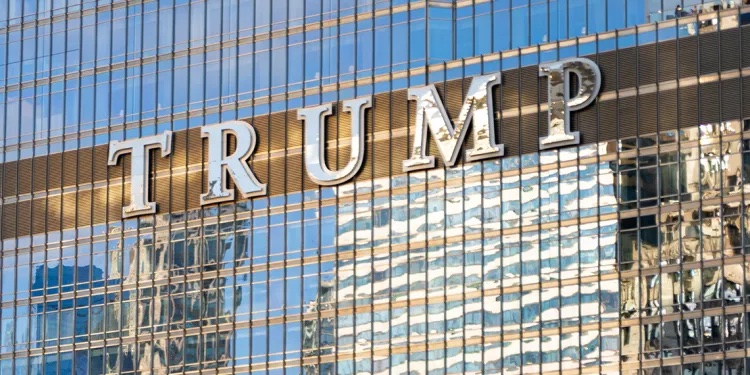Sun-Times seeks dismissal of defamation suit centered on Trump Tower reporting

SPRINGFIELD – In a case testing the limits of a state law designed to protect citizen participation in government, the Chicago Sun-Times is asking the Illinois Supreme Court to dismiss a defamation suit filed against it by a former state official.
Mauro Glorioso, a former chair of the Illinois Property Tax Appeal Board who later became its executive director, sued the newspaper in 2021, alleging he was defamed by the Sun-Times’ coverage of the board’s handling of a property tax appeal for Trump Tower in downtown Chicago.
The court, which heard oral arguments in the case last week, is not being asked to rule as to whether the Sun-Times engaged in defamation. It is rather asked if the lawsuit should be dismissed under a state law designed to protect against litigation that “chills and diminishes citizen participation in government” before the case can proceed in circuit court.
The news reporting
The February 2020 news article by investigative reporter Tim Novak centered on an anonymous November 2019 complaint to the state’s Office of Executive Inspector General that named Glorioso and others. The complaint, a copy of which was obtained by the paper, outlined alleged misconduct that occurred when Glorioso was the PTAB’s chairman, but not yet its executive director.
The complaint, which has since been ruled unfounded by the OEIG, claimed that Glorioso, a Republican, told staff “he wanted a large reduction in the assessment of Trump Tower because the owner of the property was the president of the United States.”
Staff had not initially recommended reducing property taxes, but ultimately altered their decision to recommend a $1 million reduction. A chief administrative law judge later said that decision was made to rectify an overassessment that occurred in 2011, and the recommendation to reduce the assessment was upheld by an appellate court last year.
The February 2020 article included a quote from Gov. JB Pritzker’s administration which said it was “determined to get to the bottom” of the situation and would “ensure that a thorough investigation is conducted.” Pritzker had appointed Glorioso as executive director of PTAB in 2019.
A Pritzker spokesperson quoted in the article directed the PTAB to avoid action on the appeal pending the investigation, saying “it would be entirely inappropriate for a legal decision on a property tax appeal to be impacted by any of the conduct alleged in this complaint, including the allegations of political motivations improperly driving the decision-making.”
The Sun-Times’ attorney, Damon Dunn, emphasized in oral arguments before the court the importance of Pritzker’s office being a source in the story in showing that the lawsuit is “meritless.”
“The statements to the reporter are from Gov. Pritzker,” he told the justices last week. “That’s what was published. They didn’t publish on an anonymous tip. They filed FOIA requests. They sought comment. They went all the way to the governor’s office.”
The lawsuit
Glorioso’s lawsuit, however, contends that the article improperly misstated Glorioso’s motivation as political and overstated his involvement in the decision. It also took issue with the newspaper’s October 2020 reporting on Glorioso’s termination from the board.
The lawsuit didn’t dispute that an investigation had occurred, but rather contended that the newspaper knowingly mischaracterized it.
“Defendants’ Articles falsely reported to thousands of readers that Glorioso spearheaded a corrupt scheme to funnel a more than $1 million warranted property tax reduction to Trump Tower, based solely upon political allegiance,” his legal team argued in a court filing.
More than a year after that story was published and after Glorioso sued the paper, the OEIG issued a redacted report finding the underlying accusations unfounded. But it also found that Glorioso violated state law and PTAB policy by deleting files and emails in October 2020.
The Sun-Times sought to dismiss the case under the state’s Citizen Participation Act, which specifically targets lawsuits aimed at “intimidating, harassing, or punishing citizens” for engagement in “public affairs.” Glorioso’s suit, Dunn argued, was a Strategic Lawsuit Against Public Participation, or SLAPP, and should be dismissed.
The 1st District Appellate Court ruled 2-1 in May 2023 that the Sun-Times did not meet its burden to show that the lawsuit was a SLAPP. A lower court had ruled the same.
Glorioso’s attorney Steve Zisook argued before the justices last week that the Sun-Times article didn’t seek any “government relief” as outlined in statute. Because of that, he argued, the lower courts correctly reasoned that the news article was not protected under the Citizen Participation Act – referred to as the ICPA.
“You’re just reporting news, and that is what happened in this case, and that is why the defendant’s speech in this case is not an ICPA case, and the motion was denied in the trial court,” he said.
A stack of newspapers is pictured at the Illinois State Capitol. (Capitol News Illinois file photo)
The question for review
The appellate court opinion written by Justice Aurelia Pucinski said the paper’s lawyers failed to show that the lawsuit by Glorioso was both meritless and retaliatory. A “reasonable finder of fact,” could have read the Sun-Times coverage as having “overstated Glorioso’s role and motivations in the alleged scheme beyond the actual allegations made by the whistleblower,” she wrote.
The appellate court also stated the paper failed to meet its burden to show that the lawsuit is retaliatory, in part because Glorioso requested only $50,000 in compensatory damages, along with punitive damages and legal fees. The amount, and the fact that he waited 11 months to file suit after he was no longer employed by the PTAB, “does not provide evidence that the lawsuit was retaliatory,” the majority wrote.
Justice Michael Hyman wrote a dissenting opinion that took issue with the “meritless and retaliatory” standard cited by the majority and urged the Supreme Court to clarify its precedent on the Citizen Participation Act.
By requiring a defendant to show that the lawsuit is both meritless and retaliatory, he wrote, recent judicial interpretations have “essentially weakened a potent deterrent to groundless lawsuits that target those who protest or raise concerns on matters of public interest.”
“Allowing this non-meritorious suit to continue accomplishes what the Act was designed to prevent—the wasting of time, resources, and effort by the parties and the courts on unjustifiable and unsustainable claims,” Hyman wrote.
Zisook, meanwhile, urged the court not to take part in what he dubbed a “judicial amendment” to an act of the legislature – though Dunn countered that previous appellate court decisions are what constituted judicial amendments.
Judging intent
As for the facts of the case, Hyman argued the majority improperly considered “what implications a reader or listener might draw from the reporting,” when the actual law does not.
“Just because the anonymous complaint that launched the investigation named other individuals who took part in the alleged misconduct (but conspicuously were not the subject of the OEIG investigation), the Sun-Times’s reporting on the investigation into Glorioso was neither false nor misleading,” he said.
But during oral arguments, Supreme Court Chief Justice Mary Jane Theis noted the statute “seems to require some inquiry into the intent on the part of the plaintiff,” in this case Glorioso.
“I think that’s, to me, that’s kind of the difficult part,” she said. “How does a court determine intent, whether or not the purpose for the lawsuit was, in fact, retaliatory, was to chill free speech, or was it, in fact, to pursue a constitutional right to damages for damage to one’s reputation?”
Dunn argued the justices don’t have to reconsider that interpretation in order for the Sun-Times to prevail, since, he said, the plaintiffs haven’t shown the paper acted with “actual malice.” But he said he believes the court should reconsider it anyway.
“I don’t believe that the legislature intended that at all,” he said of judging a plaintiff’s intent in filing suit. “They intended to put the burden directly on … the plaintiff who files a case that chills speech about public affairs.”
Capitol News Illinois is a nonprofit, nonpartisan news service that distributes state government coverage to hundreds of news outlets statewide. It is funded primarily by the Illinois Press Foundation and the Robert R. McCormick Foundation.
This article first appeared on Capitol News Illinois and is republished here under a Creative Commons license.
Miss Clipping Out Stories to Save for Later?
Click the Purchase Story button below to order a print of this story. We will print it for you on matte photo paper to keep forever.


